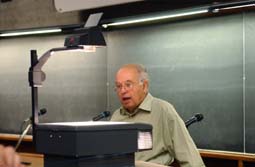Personal tools
News from ICTP 105 - Profile

Fields Medallist Sir Michael Atiyah recently visited ICTP to share his broad insights on the future of mathematics.
Sir Michael Atiyah
"Until some 20 years ago,
modern physics and mathematics seemed to be set on different unrelated
paths of discovery. Since then, however, their paths have been
crossing with increasing frequency as theories in physics have
enriched mathematics and as mathematical concepts have shaped
and directed pathbreaking insights in physics."

These were some of the observations made by Sir Michael
Atiyah, a Fields Medal winner (1966) and one of the world's
most renowned mathematicians, during his recent visit to ICTP.
Atiyah travelled to Trieste to participate in the ICTP/SISSA (International
School for Advanced Studies) Colloquium on Geometry, which was
held in honour of M.S. Narasimhan, long-time head of ICTP's Mathematics
group who was celebrating his 70th birthday.
"When the ties between mathematics and physics first began
to take hold about two decades ago," Atiyah notes, "it
was not clear whether practitioners in these fields would be crossing
paths quickly and quietly in the night or forging active long-term
ties. Two decades later, the union has proven to be an enduring
one--stronger today than ever before." Atiyah's cooperative
research efforts with the renowned string theorist Edward Witten,
which has led to a recent joint publication, is just one example
of this growing relationship between the two disciplines.
Atiyah, formerly a professor at Oxford and Cambridge, UK, is no
stranger to efforts seeking to find common intellectual ground
between different fields of knowledge. In the 1960s, he and Isadore
Singer of the Massachusetts Institute of Technology (MIT), proved
the 'index theorems,' a mathematical concept providing powerful
connections between geometry, topology, algebra and ultimately
quantum field theory. He also developed a branch of geometry called
K-theory, which was initially concerned with the interrelationship
between topology and linear analysis, but ultimately exerted an
important influence on physics, including string theory.
"The things that interest me in mathematics," says Atiyah,
"are the interconnection between different parts of mathematics"
and the way "in which mathematics can unify and simplify
our quest to answer difficult problems, whether in mathematics
itself or in other scientific fields."
Atiyah's quest to respond with clarity and precision to difficult
questions has not been limited to the classroom and blackboard.
Serving as president of the Royal Society (1990-1995) in the UK
and the internationally renowned Pugwash community (1997-2002),
which has included such luminaries as Albert Einstein, Bertrand
Russell, Max Born and Linus Pauling, Atiyah has been a leading
voice in discussions related to the role of science in society.
While heading the Royal Society, he helped to launch the InterAcademy
Panel on International Issues (IAP), an association of national
science academies, whose secretariat is now located in Trieste
under the administrative umbrella of the Third World Academy of
Sciences (TWAS). Twenty years earlier, Atiyah had been elected
a founding associate fellow of TWAS itself.
"With all of the threads being weaved between mathematics
and other disciplines, ranging from economics to physics, now
it is a great time to be a member of the mathematics profession.
There are so many new avenues to explore and questions to ask
and answer both as an intellectual challenge and for their applications
in solving critical issues of importance to our society. Young--and
not so young--mathematicians can truly have some fun crossing
different borders both within their own fields and the fields
of others."
"Mathematics," Atiyah goes on to say, "is a solitary
exercise. You sit and you think hard for hours. It gets boring,
so a bit of social interaction adds a whole new dimension and
makes life so much more interesting and attractive. Some people
don't collaborate and work by themselves, but I find interaction
one of the more satisfying parts of what I do."